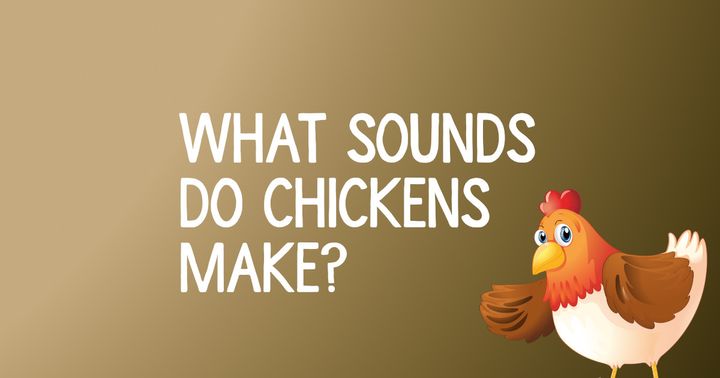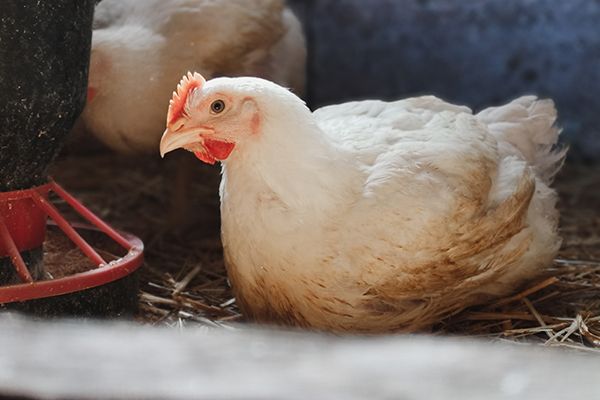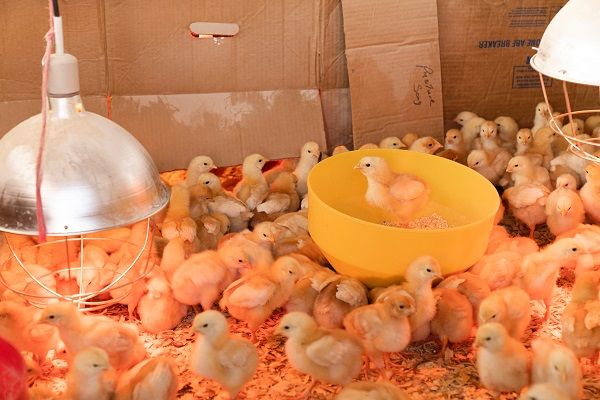What Sounds Do Chickens Make?


While no-one knows exactly how many different sounds chickens make and what they mean, experts estimate there are somewhere between 24 and 30.
Chickens are naturally talkative animals and have a complex system of communication with one another. You can't make chickens quieter, so what sounds do chickens make and are they noisy critters? If this is something you are concerned about it may be wise to really consider getting chicken.
There are breeds that are naturally more quiet and calm. These include Australorps, Buff Orpingtons, Wyandottes, Brahmas, Barred Rocks, Cochins, Mottled Javas, Speckled Sussex, Rhode Island Reds, Silkies, and Javas.
These breeds may be easier to keep in urban or more densely populated areas where noise could cause problems.
Conversely, if noise is not an issue for you and you enjoy hearing your animals talking, there are some particularly loud breeds too. These include Polish chicken, Welsummers, Easter Eggers, and Araucana.
Roosters also tend to be louder than hens and so some areas restrict the number of roosters you can keep. It is possible to attempt to train your chickens to be quiet, but we strongly advise against this.
They make sounds for the same reasons we do, and it could put them in danger to not call out when they need help.
If your chickens are completely silent, this is often an indicator that something is wrong. They may be injured, ill, or scared, and paying attention to their sounds is an easy way to spot this early on.
Hens

Hens are female chickens and tend to be very protective of their eggs and chicks.
Here are some of the noises to look out for, to ensure you keep them all happy as much as possible.
Cluck: This is the typical noise that you hear chickens make. The sounds are short, repetitive, and low pitched. You will often hear mothers making this sound to their chicks.
Food call: Another sound you are likely to hear often is the staccato and high-pitched tuck-tuck-tuck sound. Mothers will make this sound to alert their chicks that food is nearby and to call them to eat.
Hush: This is a low vibration-type noise and is used to indicate danger. It sounds kind of like an 'errrr' and will cause chicks to react instantly and defensively.
Laying cackle: This is a noise you will come to know and love, as it will become a regular part of your life. Whenever your hens lay eggs, they will loudly boast about their accomplishments with this loud cackling noise.
Hiss: We do not expect chickens to hiss, but when the hens get particularly broody or feel as though you are putting their eggs in danger, they will. They often give you a dirty look, fluff their feathers to make them appear bigger, and emit a hissing sound. This usually happens when hens are sat in their nesting box, and this is the first warning sign to leave them alone.
Growl: This is a step up from the hiss and is your final warning to leave your hen and her eggs alone. It is harsher and more aggressive and you will often find your hand being pecked if you hear this noise. Hens tend to make this sound when you are collecting eggs from their coop.
Singing: This is the hen equivalent of humming a jaunty tune while you go about your business. This will sound like random and repetitive notes but with a happy tone. This is a good indicator that your hens are content and well.
Roosters
Roosters are male chicks and are also known as cockerels when they are younger.
They often have more brightly colored feathers and large, red combs (the thing on top of their heads). Their wattles (underneath their beak) are also often more red than hens, to attract the females.
Food call: Similar to the noise a hen makes to alert their chicks to the presence of food, roosters make an excitable tuck-tuck-tuck sound when they find something to eat.
Courtship croon: This is fairly self-explanatory, it is the sound a rooster makes when he sees a hen that he likes. Roosters will usually walk in a circle around the hen and make a low rumbling noise to indicate interest.
Spotting something in the sky: As roosters are on the lookout for danger constantly, they will often look up to the sky to check for predators. If they spot anything, they are likely to make a kind of peep to alert the other chickens there is something there. This will be a short sound if there is no imminent danger.
Startled sounds: Roosters tend to squawk when they are shocked or surprised. The pitch, power, and volume of the sound varies depending on how scared the rooster is.
Crowing: This is a noise that roosters use to express dominance in the coop. Roosters will make this sound when they need to reassert their power and if they feel things are getting out of hand.
Hen and rooster chats
While there are some noises that are specific to hens, roosters and chicks there are also sounds that you will hear them sing to one another.
Hens and roosters communicate a lot while they go about their day-to-day lives, and here are some of the most common.
Contentment call: This is low pitched and implies that the group wants to remain together as they feel safe.
Nesting call: When hens have found an acceptable nest, they will call out to other hens and the roosters to let them know. Roosters will sometimes make this noise too, but the hens usually prefer to find the nest themselves.
Roosting call: You are most likely to hear this sound at night, as it indicates the chickens have found a place to settle and sleep. It is loud, quick, low-pitched, and will be made multiple times before the chickens settle.
Chicks

Chicks are so young that they have not fully developed the conversational abilities of hens and roosters. This does not mean that they are silent, just that they have their own specific noises with which they communicate.
There are 6 main sounds that you are likely to hear a chick make.
Pleasure: There are 2 noises chicks make to express pleasure. One is a peep (a gentle, irregular chirp) and another is a trill (gentle and warbling). You are likely to hear the trill when they are about to go to sleep as an indicator of contentment.
Panic: This will be a loud sound and will clearly express fear.
Distress: This is usually caused by being the wrong temperature, or by being hungry. This is loud and sharp and will clearly convey that they need help.
Fear: This is a sharp, repetitive sound and will be very loud.
Shock: This is a chirp you will hear when your chicks are startled.
Distress noises
These are all noises that you will hear at some point in your time as a chicken owner. It is normal for chickens to feel negative emotions at times, but you should not be hearing these sounds constantly.
If you do, it is wise to seek out expert advice in case there is a problem with their health or living conditions.
Caution: These will be rapid and repetitive sounds that indicate the presence of danger. Chickens will use this noise to ensure they are all on alert for predators and are being wary with their actions.
Alarm: This is a sound that you are likely to encounter during your time as a chicken owner. It is a kind of kuh-kuh-kuh-kuh-KACK noise and will be loud and shrill. This is used when the danger is imminent and the chickens are scared.
Air raid: This noise tends to be made by roosters, although hens can make it too. If the rooster spots danger in the sky, he will make a loud warning noise, similar to that of a WWII air raid alarm. This noise will make all of the chickens in the coop immediately run to safety. If your rooster makes this noise too often for no reason, the chickens will eventually stop listening which could put them in danger.
Shock: This is a sound you will hear if one of your chickens gets pecked or injured in any way. It is fairly loud and blunt but you do not need to be too concerned. This is not a noise they make if they are seriously injured.
Distress: If you are removing a chicken from a coop, or the chicken is in danger you will hear these sounds. They are very loud, drawn-out, and repetitive sounds to indicate that the chicken needs help. If other chickens hear this sound, they are likely to attack to defend their friend.
We hope this article has helped you feel more confident in understanding how your chickens communicate with each other. You never have to worry again about how your chickens are feeling, and it'll be easy to notice any problems they have.

